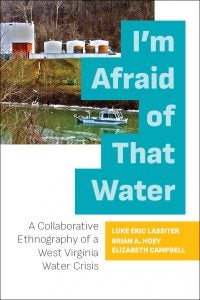On January 9, 2014, residents across Charleston, West Virginia, awoke to an unusual licorice smell in the air and a similar taste in the public drinking water. That evening residents were informed the tap water in tens of thousands of homes, hundreds of businesses, and dozens of schools and hospitals—the water made available to as many as 300,000 citizens in a nine-county region—had been contaminated with a chemical used for cleaning crushed coal.
This book tells a particular set of stories about that chemical spill and its aftermath, an unfolding water crisis that would lead to months, even years, of fear and distrust. It is both oral history and collaborative ethnography, jointly conceptualized, researched, and written by people—more than fifty in all—across various positions in academia and local communities. I’m Afraid of That Water foregrounds the ongoing concerns of West Virginians (and people in comparable situations in places like Flint, Michigan) confronted by the problem of contamination, where thresholds for official safety may be crossed, but a genuine return to normality is elusive.
Table of Contents
Introduction – Elizabeth Campbell, Brian A. Hoey, and Luke Eric Lassiter
Part I. “I’m Afraid of That Water”: A West Virginia Disaster and Water Crisis
1. The Elk River Spill: On Water and Trust – Luke Eric Lassiter
2. Exploring the (Human) Nature of Disaster – Brian A. Hoey
3. Toward a Collaborative Ethnography – Luke Eric Lassiter
4. Chemical Spill Encountered – Trish Hatfield
Part II. On Place: To Stay or Not to Stay
5. Blues BBQ – Jay Thomas
6. Citizen Response: On Leaving and Staying – Cat Pleska and Joshua Mills
7. In and Out of Appalachia – Emily Mayes
Interlude. Exploring the (Human) Nature of Disaster—Impact and Responses – Brian A. Hoey
Part III. On Making and Remaking Community
8. Activism and Community – Jim Hatfield
9. WVWaterHistory.com and Producing Digital Resources on a Water Crisis – Gabe Schwarzman
10. What Does a Water Crisis Sound Like? – Laura Harbert Allen
11. Can We Trust the Water System Now? Some Updates – Jim Hatfield
Epilogue – Luke Eric Lassiter
Afterword – Angie Rosser
Contributors / co-authors (alphabetical):
Laura Harbert Allen is an Appalachian media scholar and producer whose research interests include power, media, and knowledge production in Appalachia. She is also interested in how gender, race, and class play out in the media. Her production credits include the MacArthur Foundation, Inside Appalachia, and Making Contact.
Elizabeth Campbell taught at Marshall University from 2012 to 2018. She is currently chair of the department of curriculum and instruction at Appalachian State University. Her research explores the constitutive nature of collaborative research and writing and especially how it works—through shared agency, shared commitment, and shared humanity—to make and remake those who engage it. Her most recent collaboratively written books include Reimagining Contested Communities and Doing Ethnography Today.
Brian A. Hoey is a professor of anthropology and associate dean of the Honors College at Marshall University. His research encompasses themes of personhood and place, economic change and identity, and environmental health. His most recent book is Opting for Elsewhere from Vanderbilt University Press.
Jim Hatfield has a PhD in chemical engineering from the University of Minnesota. He had a twenty-five-year career with Union Carbide as a research scientist. He became an advocate for safe water systems following the 2014 Charleston water crisis.
Trish Hatfield is program assistant for the Marshall University Graduate Humanities Program and a board member of Step By Step, Inc. She recently retired her facilitating business so she could focus her attention on writing creative nonfiction and participating in collaborative ethnographic projects.
Luke Eric Lassiter is a professor of humanities and anthropology and director of the Marshall University Graduate Humanities Program. He is the author of several books on anthropology and ethnography, including Invitation to Anthropology, The Chicago Guide to Collaborative Ethnography, and, with Elizabeth Campbell, Doing Ethnography Today.
Emily Mayes graduated from Marshall University in 2016 with an MA in humanities and a graduate certificate in Appalachian studies. She is currently working as a high school English teacher in North Carolina.
Joshua Mills graduated from Marshall University in 2016 with an MA in humanities and a graduate certificate in Appalachian studies. He is currently working as an archaeologist and survey technician for an engineering firm in Maryland.
Cat Pleska’s memoir, Riding on Comets, was a finalist in Foreword Reviews’ memoir category. She edited the 2019 anthology Fearless: Women’s Journeys to Self-Empowerment. She is working on an essay collection titled The I’s Have It: Traveling Ireland and Iceland.
Angie Rosser is the executive director of West Virginia Rivers Coalition, bringing a background of working in West Virginia on social justice issues in the nonprofit sector. She holds a BA in anthropology from the University of North Carolina at Chapel Hill and an MA in organizational communication from West Virginia University.
Gabe Schwartzman is pursuing a PhD in geography at the University of Minnesota and has produced several research projects about the Appalachian coal fields, including interactive mapping project WVWaterHistory.com and oral histories of the Appalachian South Folklife Center and Blair, West Virginia, both housed at the University of Kentucky.
Jay Thomas, 2017 Marshall University MA in humanities graduate, is a restaurateur and lover of literature. He and his wife, Honor, are relocating to the eastern panhandle of West Virginia. Their daughter, Daisy, is an actress living in Brooklyn, New York, and their son, Jake, is a student at Shepherd University.
***
The book also includes several photographs by 2016 MA grad Wes Kuemmel, who, after completing his degree, and with his daughters in college, moved from West Virginia along with wife Caitlin, to a small farm in Ohio.
***
Media….
Charleston Gazette-Daily Mail: Forthcoming book documents the 2014 Elk River chemical spill
Book and Angie Rosser (author of Afterword) featured on C-SPAN
